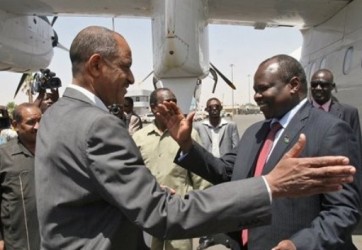Amum says criticism of Addis Ababa agreement is out of ignorance
October 13, 2012 (JUBA) – The Secretary General of the ruling Sudan People’s Liberation Movement (SPLM), Pagan Amum, and lead negotiator in the recently signed Addis Ababa cooperation agreement with Sudan lashed out at those criticizing the agreement saying they were misinformed.

A number of civil society organizations also criticized the agreement with some describing it as a sell-out.
In a televised statement on Friday, Amum defended the agreement and said the misunderstanding was “caused by people who have not seen or read the agreement.”
He further explained that there is a difference between the border demarcation and the security arrangement between Sudan and South Sudan as per the agreement.
The two countries shall continue to negotiate on the final borderline between them while using the temporary security arrangement of a demilitarized buffer zone extending 10kms either side of a notion and non-binding line suggested by the African Union mediation.
As a result President Salva Kiir has briefed the governors of South Sudan’s ten states on the agreement, Amum said, adding that this was to clear up the confusion.
The President will also brief the parliament on Monday to further explain the contents of the agreement and ask for its ratification.
When the African Union mediation proposed its map to operationalise the dematerialised zone, Sudan’s rejection pushed the African Union Peace and Security Council to demand to include it in a process to settle the unresolved issues between the two countries and to demand the Security Council to issue a resolution under Chapter VII of its Charter.
In its Resolution 2046 the security Council said “that the center line of the (Safe Demilitarised Border Zone) SDBZ in no way prejudices the current or future legal status of the border, ongoing negotiations on the disputed and claimed areas, and demarcation of the border.”
The resolution further praised Juba for accepting the map and however called “on it to withdraw any forces located to the north of the SDBZ center line.”
At the time, the Juba was seen as the obedient disciple while Sudan was considered as the annoying pupil because it kept repeating that “14 mile” is a Sudanese territory preventing as progress in the talks despite the three-month ultimatum given in Resolution 2046.
The issue of 14 mile gave the opportunity for others to criticise the signed agreements and different voices have said they opposed to the “four freedoms” agreements, a matter that might hamper the adoption of the cooperation agreement by the national parliament next week.
The “four freedoms” agreement was initially in March 2012 creating a framework allowing citizens of both states to enjoy freedom of residence, freedom of movement, freedom to undertake economic activity and freedom to acquire and dispose property.
Amum further revealed that the cooperation agreement on all its aspects such as on oil, security, and four freedoms will be valid for only three and a half years.
He informed the public that the two countries were provided with the right to revoke and cancel it in 60 days’ notice if either of them so wishes.
“If South Sudan sees that it [the agreement] is not in their interest, they can cancel it in 60 days,” he said.
(ST)
